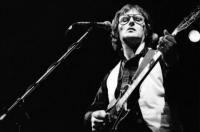Gerry Rafferty Free Sheet Music
 Gerry Rafferty (born Gerald Rafferty, 16 April 1947, in Paisley) is a Scottish singer and songwriter. He is the son of a Scottish mother and an Irish father.
Gerry Rafferty (born Gerald Rafferty, 16 April 1947, in Paisley) is a Scottish singer and songwriter. He is the son of a Scottish mother and an Irish father.In his early years, Gerry Rafferty earned money busking on the London Underground. Poetically, his biggest hit "Baker Street" was about busking at a tube station. After working with Billy Connolly in a band called The Humblebums, he recorded a first solo album, Can I Have My Money Back. In 1972 Rafferty and his old school friend Joe Egan formed Stealers Wheel, a group which was beset by legal wranglings, but did have a huge hit "Stuck in the Middle With You" (made famous for a new generation in the movie Reservoir Dogs) and the smaller top 40 hit "Star" ten months later. The duo disbanded in 1975.
In 1978, Gerry Rafferty cut a solo album, City to City, which included the song with which he remains most identified, "Baker Street". The single reached No. 3 in the UK and No. 2 in the U.S. The album sold over 5.5 million copies, toppling the Saturday Night Fever soundtrack in the U.S. on 8 July 1978. Even today, "Baker Street", which features a "glistening" saxophone solo by Raphael Ravenscroft, remains a mainstay of soft-rock radio airplay. Another song from the City to City album, "Right Down the Line," also continues to receive copious radio airplay. Also from City to City, "Home and Dry" managed a #28 spot in the US Top 40 in early 1979. One of the more obscure tracks from that time is "Big Change in the Weather" (the B-side of "Baker Street"). His next album, Night Owl, also did well with the help of guitarist Richard Thompson performing on the track "Take The Money and Run", and the title track was a UK No. 5 hit in 1979. "Days Gone Down" reached #17 in the U.S. The follow-up single "Get It Right Next Time" made the UK & US Top 40.
Subsequent albums, such as Snakes and Ladders (1980), Sleepwalking (1982), and North and South (1988), fared less well, perhaps due partly to Rafferty's general reluctance to perform live. "Don't Give Up On Me", from his 1992 collection On A Wing and a Prayer, is a much-featured oldie on BBC Radio 2. That album reunited him with Stealers Wheel partner Joe Egan on several tracks. Rafferty redid his own "Her Father Didn't Like Me Anyway" on the album Over My Head (1994). Another World, released in 2000, was originally available only by direct order via his no longer active website but is now available on the Hypertension label. Another World featured an album cover illustrated by John Byrne 'Patrick', who also illustrated the covers for Can I Have My Money Back?, City to City, Night Owl, and Snakes and Ladders, as well as all three Stealers Wheel albums.
In 2009, Rafferty released Life Goes On, again on Hypertension. This album features a mixture of new recordings, including covers of Christmas carols and traditional songs, and re-mastered tracks from previous Rafferty albums.
Away from his album work, Rafferty also contributed to the soundtrack to the film, Local Hero - "The Way it Always Starts" (1983), and co-produced The Proclaimers' first UK hit single, "Letter From America", in 1987 with Hugh Murphy.
 Sheet Music Exchange is a web site for those who wants to access popular sheet music easily,
letting them download the sheet music for free for trial purposes.
It's completely free to download and try the listed sheet music, but you have to delete the files after 24 hours of trial period.
Don't forget, if you like the piece of music you have just learned playing,
treat the artist with respect, and go buy the original sheet music.
Sheet Music Exchange is a web site for those who wants to access popular sheet music easily,
letting them download the sheet music for free for trial purposes.
It's completely free to download and try the listed sheet music, but you have to delete the files after 24 hours of trial period.
Don't forget, if you like the piece of music you have just learned playing,
treat the artist with respect, and go buy the original sheet music.


